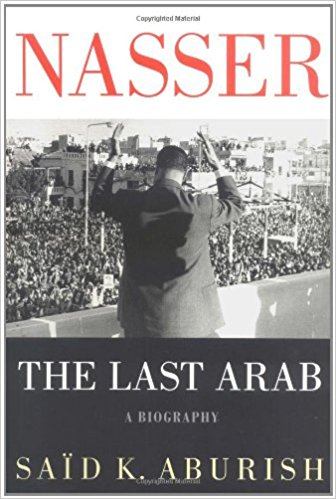
For the last 70 odd years, the Middle East has been one of the most contentious areas politically, religiously and socially. It has attracted the interests of British, trying to maintain the Suez, and Exxonmobil trying to cash in on gushing oil from the ground of Saudi. One of the most interesting stories from the period between the 1950s and 1970s, is the story of Gemal Abdel Nasser a famous Arab leader, who if you ask most Arabs to this day is seen as the primary leader in trying to achieve social, political and financial equity for the Arabs. Often disliked by Western and Soviet interests, he was one to go against the grain in the Middle East as it's widely noted that he was one of the few leaders who turned out not to be corruptible. This biography written by arguably one of the most knowledgeable journalists to stem from the middle east, who studied in America and had contacts with the likes of Saddam Hussein and Yasser Arafat at some points. He is often seen as a radical voice for change in the middle east, and thinks of Abdel Nasser as the true leader the middle east needed. While he recognizes his flaws, he sees the use of Arab nationalism with the economic policies of land reform such as the dramatic one imposed by Nasser as the most effective strategy towards, ridding imperialist interest from the American and British, as well as uniting the Arab world behind the causes of nationalizing industry.
The book spans the life of Abdel Nasser, starting from his extremely humble beginnings on the outskirts of Alexandria, to his early days of protest as a student in Cairo, organizing anti-British colonialist rallies, and increasing pressure on King Farouk, the pro-British ruler of Egypt at the time. However the majority of the book talks about Abdel Nasser's policies, the strategy he uses, his achievements and his downfalls. While the effects of his land reform reeked the benefit of the Egyptian people, as previously 2% of the people had owned 75% of the land, the Egyptian economy slightly struggled due to sanctions imposed by Western powers, as they disliked this behavior from Abdel Nasser, as at the time especially the thought of completely controlling your own interests as an Arab leader were seen as laughable and most were usually crushed. However as described in the book Abdel Nasser hanged strong, as was shown in the 56’ Suez Crisis in which Britain and France attempted to stop Nasser from nationalizing the Suez. While he wasn’t totally successful in doing this, he managed to hold France and Britain off, which is often seen as the death knell for both the British and French empires. This caught the attention of many in the Arab world, as soon Abdel Nasser managed to create a new Arab state combining Egypt and Syria, and while this did not last in the long term it created movements all across the Middle East that pushed for the self interests of Arabs- however effective or ineffective they may have been. However towards the end of his reign, and life would be his darkest hour as the book describes which was the loss to Israel in 1967, in which attempts by Nasser to gain land for Palestinians was ultimately high unsuccessful. The faults of the Egyptian army were pointed at Jordan, but it still tarnished the legacy slightly of Abdel Nasser as he then died in 1970 due to a heart attack with mass amounts of grievances in the streets of Cairo.
Reading this, combined with my own understanding of Middle Eastern history it's apparent to me that while Abdel Nasser had his flaws, he was probably the most effective Arab leader in implementing and inspiring change and despite facing great opposition from powers all over the western world and even parts of the Arab world in Saudi Arabia. He still managed to gain popular support and inspire movements for years to come even to this day. While the fact he ruled as a dictator is obviously not the ideal manner in which a country should be ruled, the likes of Abdel Nasser eventually create this democracy as they thrive off the popularity and the backing of the people as any Egyptian living in that time can attest to this day.
My rating of this book would be 9/10, as I found it to be highly informative, engaging and shedding light on a perspective that is not seen enough often in American political thought about the middle east. It explains in detail the different cultural contexts that had been occurring at the time and is an effective look at one of the Middle East’s most effective leaders by arguably one of the most critically acclaimed Arab journalists of all time.